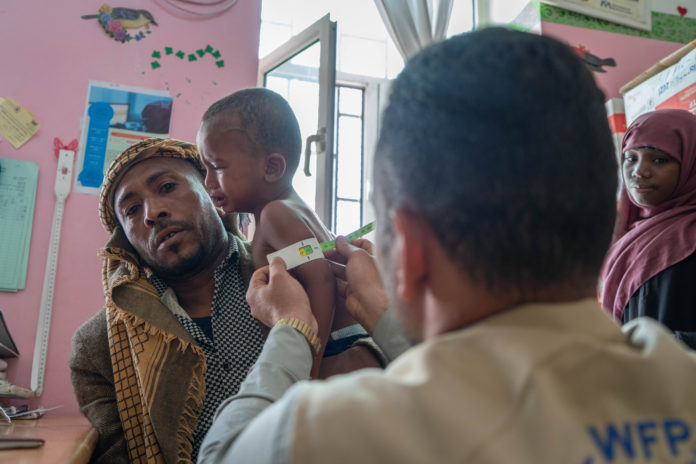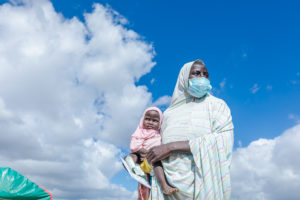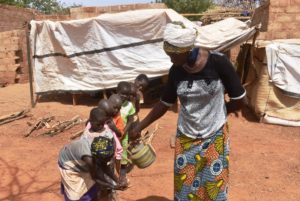
The United Nation’s World Food Programme Chief has urged the world’s wealthiest billionaires and nations to contribute in efforts to save 30 million from hunger accelerated by the Covid-19 pandemic.
WFP chief David Beasley in a statement said a toxic mix of conflict, climate change, and the coronavirus pandemic is pushing millions of people to starvation.
Beasley told the UN Security Council on Thursday the program needs $4.9 billion to feed, for one year, as 30 million people are going to die without assistance.
The WFP chief pointed out that there are over 2,000 billionaires worldwide with a net worth of $8 trillion. In the US alone, he cited that there are 12 individuals with $1 trillion net worth.
Beasley also said three billionaires even earned billions during the pandemic.
In the 11 weeks since the March lockdowns started, Amazon.com Inc founder Jeff Bezos saw his wealth soar by about $36.2 billion, while Facebook Inc CEO Mark Zuckerberg’s fortune surged by about $30.1 billion. Tesla Inc Chief Executive Elon Musk’s net worth also rose $14.1 billion.
The US’ Institute for Policy Studies in June reported that the combined wealth of America’s billionaires jumped over 19% or half a trillion since the outbreak of the novel coronavirus pandemic.
“It’s time for those who have the most to step up, to help those who have the least in this extraordinary time in world history. To show you truly love your neighbor. The world needs you right now and it’s time to do the right thing,” Beasley said.
Covid-19 accelerated hunger in Africa, Yemen

COVID-19 is undermining nutrition among the world’s most vulnerable people – particularly children, pregnant and breastfeeding mothers. Failing to prevent and treat malnutrition now will lead to massive loss of life, human capital and economic development. The pandemic is making it eFundcially hard for poor families to afford a nutritious diet, with lack of incomes, remittances and undermined livelihoods having a ruinous effect on vulnerable communities. WFP is also scaling up its food and nutrition support to reach those affected by COVID-19 in Borno, Adamawa and Yobe States where a decade-long conflict has thrust millions of people into hunger.
Women wait to receive their food ration at the WFP distribution point
Image Source: WFP/Oluwaseun Oluwamuyiwa
The UN program official said since April, they have warned of a hunger pandemic that threatened to push 270 million people in three dozen countries to the brink of starvation.
Since then, he disclosed that wealthy nations and leaders took action by spending $17 trillion on fiscal stimulus and central bank support. He also said the International Monetary Fun and the G20 nations threw a lifeline to the poorest nations by suspending debt repayments that made a huge impact.
“Along with our partners, WFP is going all-out to reach as many as 138 million people this year – the biggest scale-up in our history. Already, in the first six months of 2020, we’ve reached 85 million people,” he told the Security Council. He also warned that the global hunger crisis caused by conflict, and now compounded by COVID-19, is moving into a new and dangerous phase – especially in nations already scarred by violence like Yemen, Democratic Republic of Congo, and South Sudan.
Some 400 million full-time jobs were also affected by the lockdowns caused by the Covid-19 pandemic.
The impact has also been felt hardest by the 2 billion people who work in the informal economy around the world – mainly in middle and low-income countries. He said some are only a day’s work away from hunger.
“It is critically important we balance sensible measures to contain the spread of the virus, with the need to keep borders open and supply chains going and trade flows moving. We also have to be vigilant and guard against unintended consequences, which could hit the poorest people the hardest,” he said.
The London School of Health and Tropical Medicine have analyzed the closure of vaccination clinics in Africa during the lockdown. It calculated that for every COVID-19 death prevented, as many as 80 children may die due to a lack of routine immunizations.
He also warned there is a grave danger that many more people will die from the broader economic and social consequences of COVID-19 than from the virus itself, especially in Africa.
“Your continued support for humanitarian programs is critical right now. It’s a matter of life and death – literally. For millions of people in the countries being discussed today. And for many millions more in the other countries edging closer to the brink of starvation. We know that, already, there are 30 million people who rely solely on WFP for their survival. That’s the only food they get. If they don’t get the food we provide, the die,” he said.
Food insecurity, conflict threatens many poor countries

In the Democratic Republic of Congo, he said conflict and instability had already forced 15.5 million people into crisis levels of food insecurity.
The same scenario of hunger and famine is seen in Yemen, which he touted as the world’s worst catastrophe and worst human disaster as 20 million people are already in crisis due to war, a collapsed economy, and currency devaluation, crippling food prices and the destruction of public infrastructure.
Because of a lack of funding, he said 8.5 million WFP beneficiaries in Yemen only receive assistance now every other month.
“We will be forced to cut rations for the remaining 4.5 million by December if funds do not increase. You can only imagine the impact that will have on the Yemeni people,” he said.
In Nigeria, he also detailed that Covid-19 is forcing more people to food insecurity with reduced incomes in 80 percent of households. In northeast Nigeria, 4.3 million people are food insecure, up by 600,000 largely due to COVID-19.
In South Sudan, the outlook there is similarly worrying, where even before the pandemic, 6.5 million people were expected to face severe food insecurity at the height of the lean season.
He shared that the number of people facing crisis levels of hunger in South Sudan has tripled to 3.3 million people, as Covid-19 compounds the situation of displacement, security, and access problems.
In parts of Latin America, he also said hungry families have started hanging white flags outside their houses to show they need help. WFP data also showed 17.1 million severely food insecure people today as compared with 4.5 million only six or seven months ago.


